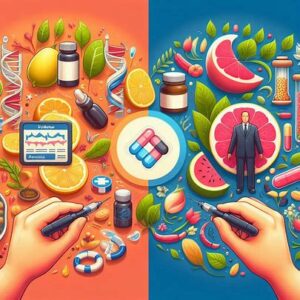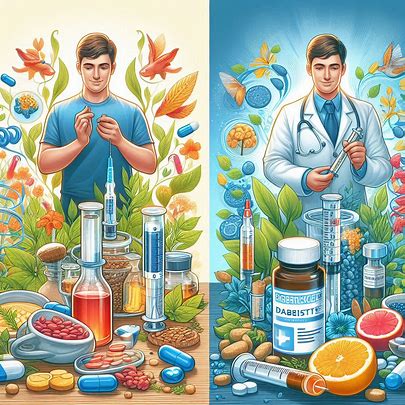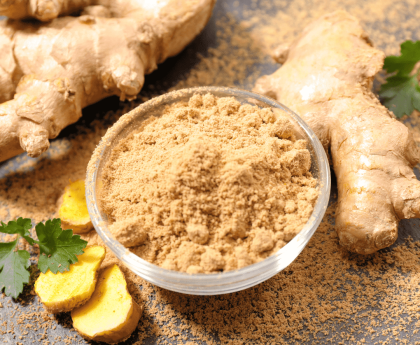Type 2 diabetes is a chronic condition that affects millions of people worldwide, characterized by the body’s inability to use insulin effectively, leading to high blood sugar levels.
While conventional treatments, including medication and lifestyle changes, are crucial in managing the condition, many people are exploring complementary approaches, such as using herbs, to help reverse Type 2 diabetes.
This article delves into how certain herbs may assist in managing and potentially reversing Type 2 diabetes, while emphasizing the importance of integrating these natural remedies into a holistic treatment plan.
Understanding Type 2 Diabetes
Type 2 diabetes occurs when the body either resists the effects of insulin or doesn’t produce enough insulin to maintain normal glucose levels. Over time, high blood sugar levels can lead to severe complications, including heart disease, kidney failure, and nerve damage.
While there is no cure for Type 2 diabetes, it can be managed, and in some cases, blood sugar levels can be brought to normal levels through lifestyle changes, including diet, exercise, and the use of herbal remedies.

The Role of Herbs in Reversing Type-2 Diabetes
Several herbs have been studied for their potential to help regulate blood sugar levels, improve insulin sensitivity, and support overall metabolic health.
While these herbs can be beneficial, they should not replace conventional treatment but rather complement it. Below are some of the most promising herbs for managing and potentially reversing Type 2 diabetes.
1. Berberine
Berberine is a compound found in several plants, including goldenseal, barberry, and Oregon grape. It has been shown to improve insulin sensitivity and reduce glucose production in the liver, making it a powerful tool in managing Type 2 diabetes.
Studies suggest that berberine can lower blood sugar levels as effectively as some pharmaceutical drugs, making it a promising herbal remedy for those looking to reverse Type 2 diabetes.
2. Cinnamon
Cinnamon is a popular spice with potent antioxidant properties. Research indicates that cinnamon can lower fasting blood glucose levels and improve insulin sensitivity, which are critical in managing Type 2 diabetes.
Cinnamon’s ability to slow down the breakdown of carbohydrates in the digestive tract helps prevent spikes in blood sugar levels after meals, making it a valuable addition to a diabetes-friendly diet.
3. Fenugreek
Fenugreek seeds are rich in soluble fiber, which helps slow down the absorption of carbohydrates and sugars in the digestive tract. This property makes fenugreek an effective herb for managing blood sugar levels in people with Type 2 diabetes.
Studies have shown that fenugreek can improve insulin function and reduce fasting glucose levels, making it a beneficial herb in the fight against Type 2 diabetes.
4. Bitter Melon
Bitter melon is a fruit that has been used in traditional medicine for centuries to treat various ailments, including Type-2 diabetes. It contains compounds that mimic insulin, which can help lower blood sugar levels.
Bitter melon is particularly effective in reducing post-meal blood sugar spikes, making it an essential herb for those aiming to reverse Type 2 diabetes naturally.
5. Gymnema Sylvestre
Gymnema Sylvestre, often referred to as the “sugar destroyer,” is an herb traditionally used in Ayurvedic medicine. It has been shown to reduce sugar absorption in the intestines and enhance insulin function.
Gymnema Sylvestre may also help regenerate insulin-producing cells in the pancreas, making it a potent herb for those with Type 2 diabetes looking to restore normal blood sugar levels.
6. Aloe Vera
Aloe Vera is well-known for its soothing and healing properties, but it also has potential benefits for people with Type-2 diabetes. Studies suggest that Aloe Vera can lower blood glucose levels and improve insulin sensitivity. The gel from Aloe Vera leaves can be consumed to help manage blood sugar levels, making it a natural remedy worth considering for Type-2 diabetes management.
7. Turmeric
Turmeric, a spice commonly used in Indian cuisine, contains curcumin, a compound with powerful anti-inflammatory and antioxidant properties.
Curcumin has been shown to improve insulin sensitivity and reduce blood sugar levels, making turmeric a valuable herb for those managing Type-2 diabetes. Incorporating turmeric into your diet may help control blood sugar levels and protect against diabetes-related complications.
Conclusion
While Type-2 diabetes is a serious condition that requires careful management, integrating herbs into your treatment plan may offer additional support in reversing the disease. Berberine, cinnamon, fenugreek, bitter melon, Gymnema Sylvestre, Aloe Vera, and turmeric are some of the herbs that have shown promise in helping to manage and potentially reverse Type-2 diabetes.
However, it’s essential to consult with a healthcare provider before incorporating any herbs into your treatment regimen, as they may interact with medications or have side effects.
By combining the power of herbs with conventional treatment and a healthy lifestyle, you can take significant steps toward reversing Type-2 diabetes and improving your overall well-being.
Diabet-Off is a herbal supplement that contains all the above stated herbs. Click here to order
Frequently Asked Questions
How can you prevent diabetes?
Preventing diabetes involves maintaining a healthy lifestyle. This includes regular physical activity, a balanced diet rich in whole grains, fruits, vegetables, and lean proteins, and limiting sugary foods and beverages.
Maintaining a healthy weight, avoiding smoking, and managing stress are also crucial. Regular health check-ups can help monitor blood sugar levels and detect any early signs of diabetes, allowing for prompt intervention.
How does diabetes affect life?
Diabetes can significantly impact life by requiring constant management of blood sugar levels through diet, exercise, and medication.
If not properly controlled, diabetes can lead to complications like heart disease, kidney failure, nerve damage, and vision loss. It can also affect daily activities and overall quality of life, making it essential to adhere to a strict health regimen.
How to reduce sugar in blood?
Reducing blood sugar levels involves a combination of lifestyle changes and, if necessary, medication. Regular exercise helps improve insulin sensitivity, while a diet low in refined carbs and sugars prevents blood sugar spikes.
Drinking plenty of water, eating fiber-rich foods, and managing stress also contribute to lower blood sugar levels. In some cases, medications like insulin or metformin may be required.
What is diabetes caused by?
Diabetes is caused by a combination of genetic and lifestyle factors. Type 1 diabetes occurs when the immune system mistakenly attacks insulin-producing cells in the pancreas. Type 2 diabetes is primarily linked to insulin resistance, often due to obesity, sedentary lifestyle, and poor diet. Other factors include age, family history, and certain medical conditions that affect insulin production or use.
What are Diabetes symptoms?
Diabetes symptoms include frequent urination, excessive thirst, extreme hunger, unexplained weight loss, fatigue, blurred vision, slow healing of cuts or bruises, and frequent infections.
In Type 2 diabetes, symptoms may develop gradually and can be subtle, while in Type 1 diabetes, symptoms often appear suddenly. It’s important to seek medical advice if you experience any of these symptoms.
What is Diabetes mellitus?
Diabetes mellitus is a chronic condition characterized by high blood sugar levels due to the body’s inability to produce enough insulin or effectively use the insulin it produces.
The condition is classified into two main types: Type 1 diabetes, where the body doesn’t produce insulin, and Type 2 diabetes, where the body becomes resistant to insulin. Proper management is crucial to prevent complications.
What are the Causes of diabetes?
Diabetes is caused by different factors depending on the type. Type 1 diabetes is an autoimmune condition where the immune system attacks insulin-producing cells.
Type 2 diabetes is primarily caused by insulin resistance, often due to obesity, lack of exercise, poor diet, and genetic factors. Other causes include hormonal changes, certain medications, and pancreatic diseases.
What are Diabetes treatment?
Diabetes treatment involves managing blood sugar levels through a combination of lifestyle changes and medications. For Type 1 diabetes, insulin therapy is essential.
Type 2 diabetes can often be managed with oral medications, lifestyle modifications like diet and exercise, and sometimes insulin. Regular monitoring of blood sugar levels, healthy eating, physical activity, and routine check-ups are crucial components of treatment.
What is Type 2 diabetes?
Type 2 diabetes is a chronic condition where the body becomes resistant to insulin or doesn’t produce enough insulin to maintain normal blood sugar levels. It’s often linked to obesity, lack of physical activity, and poor diet.
Type 2 diabetes is more common in adults but can occur in younger individuals. Management includes lifestyle changes, medications, and regular blood sugar monitoring.
What are the types of Diabetes?
The main types of diabetes are Type 1, Type 2, and gestational diabetes. Type 1 diabetes is an autoimmune condition where the body attacks insulin-producing cells.
Type 2 diabetes is characterized by insulin resistance and is often linked to lifestyle factors. Gestational diabetes occurs during pregnancy and increases the risk of developing Type 2 diabetes later in life. Other less common types include monogenic diabetes and secondary diabetes.
What is Type 1 diabetes?
Type 1 diabetes is an autoimmune condition where the immune system attacks and destroys insulin-producing beta cells in the pancreas. This leads to a lack of insulin, causing high blood sugar levels.
It typically develops in childhood or adolescence but can occur at any age. People with Type 1 diabetes require lifelong insulin therapy to manage their blood sugar levels.
How to prevent diabetes?
Preventing diabetes, especially Type 2, involves adopting a healthy lifestyle. This includes regular physical activity, maintaining a healthy weight, and eating a balanced diet rich in whole grains, fruits, vegetables, and lean proteins.
Limiting sugar and refined carbohydrates, avoiding smoking, and managing stress are also key. Regular screenings and monitoring blood sugar levels can help catch early signs and prevent the onset of diabetes.
Can a person with diabetes live long?
Yes, a person with diabetes can live a long and healthy life with proper management. This involves controlling blood sugar levels through medication, diet, and exercise, and regularly monitoring for complications.
Early detection and effective management of diabetes-related conditions, such as heart disease and kidney problems, also play a crucial role in ensuring longevity.
How do you flush out diabetes?
Flushing out diabetes is not possible, but managing blood sugar levels effectively can help control the condition. This involves a combination of a healthy diet, regular exercise, proper hydration, and possibly medication.
Drinking water helps the kidneys remove excess sugar from the blood through urine, while fiber-rich foods and regular physical activity improve insulin sensitivity.
What are the herbal remedies for diabetes?
Herbal remedies like cinnamon, fenugreek, bitter melon, berberine, and aloe vera are commonly used to help manage diabetes. These herbs may help lower blood sugar levels, improve insulin sensitivity, and reduce complications associated with diabetes.
However, it’s essential to consult with a healthcare provider before using herbal remedies, as they can interact with medications or have side effects.
What foods should you avoid if you have diabetes?
If you have diabetes, it’s important to avoid foods high in refined sugars, processed carbohydrates, and unhealthy fats. This includes sugary drinks, sweets, white bread, pastries, and fried foods.
Foods high in trans fats, such as margarine and packaged snacks, should also be avoided. Instead, focus on whole grains, lean proteins, vegetables, and healthy fats to manage blood sugar levels.
Which injection can cure diabetes?
Currently, there is no injection that can cure diabetes. Insulin injections are used to manage Type 1 diabetes and sometimes Type 2 diabetes, helping to control blood sugar levels. Other injectable medications, like GLP-1 receptor agonists, are also used to manage Type 2 diabetes, but they do not cure the disease. Research is ongoing to find more effective treatments and potential cures.
![]()




